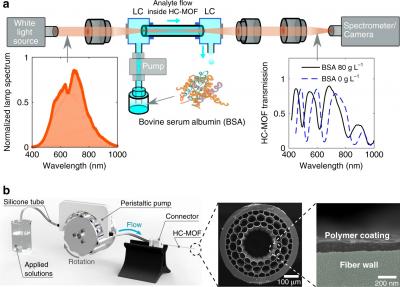
Credit: Timur Ermatov et al/Light: Science & Applications
Skoltech researchers and their colleagues from Russia and Israel have come up with a new, simple and inexpensive method of testing liquid biological samples that can be further developed to work in clinical settings, including real-time testing during surgery. The paper was published in the journal Light: Science & Applications.
The most common method of real-time diagnostic testing for biological samples (such as urine or saliva) that is used in the healthcare system, optical label-free sensors, are highly sensitive, but that sensitivity comes at a cost in terms of time and resources. Looking for a more efficient alternative, the research team, coordinated by Prof. Dmitry Gorin from the Center for Photonics and Quantum Materials at the Skolkovo Institute of Science and Technology (Skoltech) and Dr. Roman Noskov from Tel Aviv University, turned to the data that these sensors normally disregard: optical dispersion of the refractive index of a sample that can act as a fingerprint of sorts for tracking the changes in its composition.
They introduced the concept of in-fiber multispectral optical sensing (IMOS) for liquid biological samples in both static and real-time modes. According to the team, this sensing method is precise, reliable and very sensitive to impurities in the sample, which can make it useful both for diagnostic purposes and for real-time simulations of various biological processes.
Hollow-core microstructured optical fiber (HC-MOF), a particular kind of optical fibers which confine light inside a hollow core surrounded by microstructured cladding, is at the heart of the new sensing approach. Liquid goes through chambers in the fiber, and spectral shifts of maxima and minima in the transmission spectrum of HC-MOF are interpreted as signals about the chemical composition of the sample. With no need for an external cavity or interferometer, the sensing system is easy and inexpensive to produce.
The researchers tested its performance on the concentration of bovine serum albumin (BSA), which is commonly used in such experiments, dissolved in water and in a phosphate-buffered saline solution. The resolution they were able to show consistently in several experiments was equivalent to 1 gram of BSA in a liter of liquid, close to the accuracy of standard albumin tests and potentially meets clinical needs.
“Our concept can be considered a platform for intraoperative analysis of biomarkers of different types. For that, we need to test it on other bioanalytes and further modify the hollow core fiber to increase specificity. Future trials of these point-of-care devices will serve as the first step for realization of the true ‘bench-to-bedside’ approach,” Gorin notes.
“In-fiber multispectral optical sensing opens new horizons in fast, cheap, and reliable analysis of blood and other bodily liquids in real time that is important for timely diagnostics of various diseases and abnormal conditions,” Noskov adds.
The team plans to continue their research in increasing specificity as well as sensitivity of this approach. They are going to file a patent application and look for industrial partners and investors interested in developing clinical devices based on this type of sensors.
###
This work is a result of a collaboration between not only Skoltech and Tel Aviv university, but also other organizations, including Saratov State University, Moscow State University, Moscow Institute of Physics and Technology, Tomsk State University, RAS Institute of Precision Mechanics and Control, and Nanostructured Glass Technology, an industrial partner.
Media Contact
Ilyana Zolotareva
[email protected]
Original Source
https:/
Related Journal Article
http://dx.




